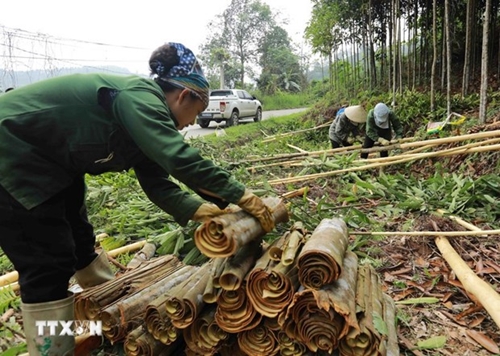Last year, Vietnam exported nearly 90,000 tons of cinnamon to earn over 260 million USD, up 14.6% in volume, but down 10.7% in value compared to 2022. The average price reached 2,918 USD a ton, down 22.1% year-on-year.
India was the main importer of Vietnamese cinnamon with more than 38,000 tons, accounting for 42.6%. It was followed by the U.S. with more than 10,100 tons, and Bangladesh nearly 6,000 tons.
    |
 |
|
Lao Cai people harvest cinnamon. |
In the first two months of this year, Vietnam pocketed 30 million USD from shipping 10,500 tons of cinnamon abroad.
Hoang Thi Lien, president of the Vietnam Pepper and Spice Association (VPSA), said that over the past time, farmers have continuously developed new farming techniques to improve the quality and productivity of cinnamon trees. In addition, production linkage models between businesses and farmers have been increasingly implemented to gradually expand sustainable raw material areas.
Vietnam has dozens of companies investing in modern cinnamon processing lines for more quality products to meet market requirements.
Among the 16 signed free trade agreements, there are many new generation ones such as the E.U. - Vietnam FTA, the Comprehensive and Progressive Agreement for Trans-Pacific Partnership (CPTPP), and the Regional Comprehensive Economic Partnership (RCEP) that have helped Vietnam have an advantage over some other countries in terms of tax. This is a very favorable condition and opportunity for Vietnamese cinnamon products to advance further in the international market.
Currently, Vietnamese cinnamon has been exported to nearly 100 countries around the world, accounting for 95% of the market share of the Indian market, 36.5% of the U.S. and 35% of the European market. However, the export rate of processed cinnamon accounts for only 18.6%, or 18,659 tons, of which 70% is exported to the U.S., and 12% to Europe.
Therefore, the sector will continue to improve post-harvest and processing quality to increase exports to demanding markets in Europe and the U.S.
It will step up trade promotion activities, build brand identity on a national scale, encourage public private partnership models and seek support resources and policy consultations in a long-term strategy of turning Vietnam into the leading sustainable cinnamon supplier in the world.
Source: VNA